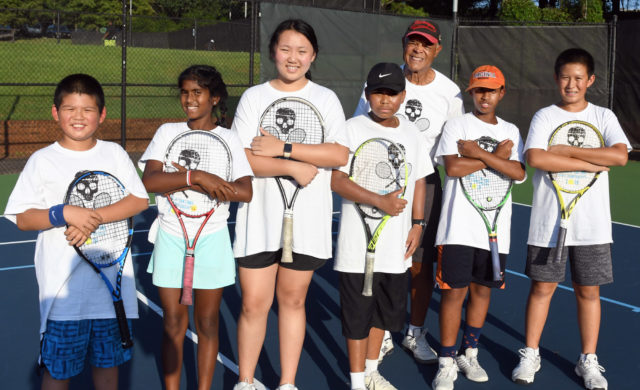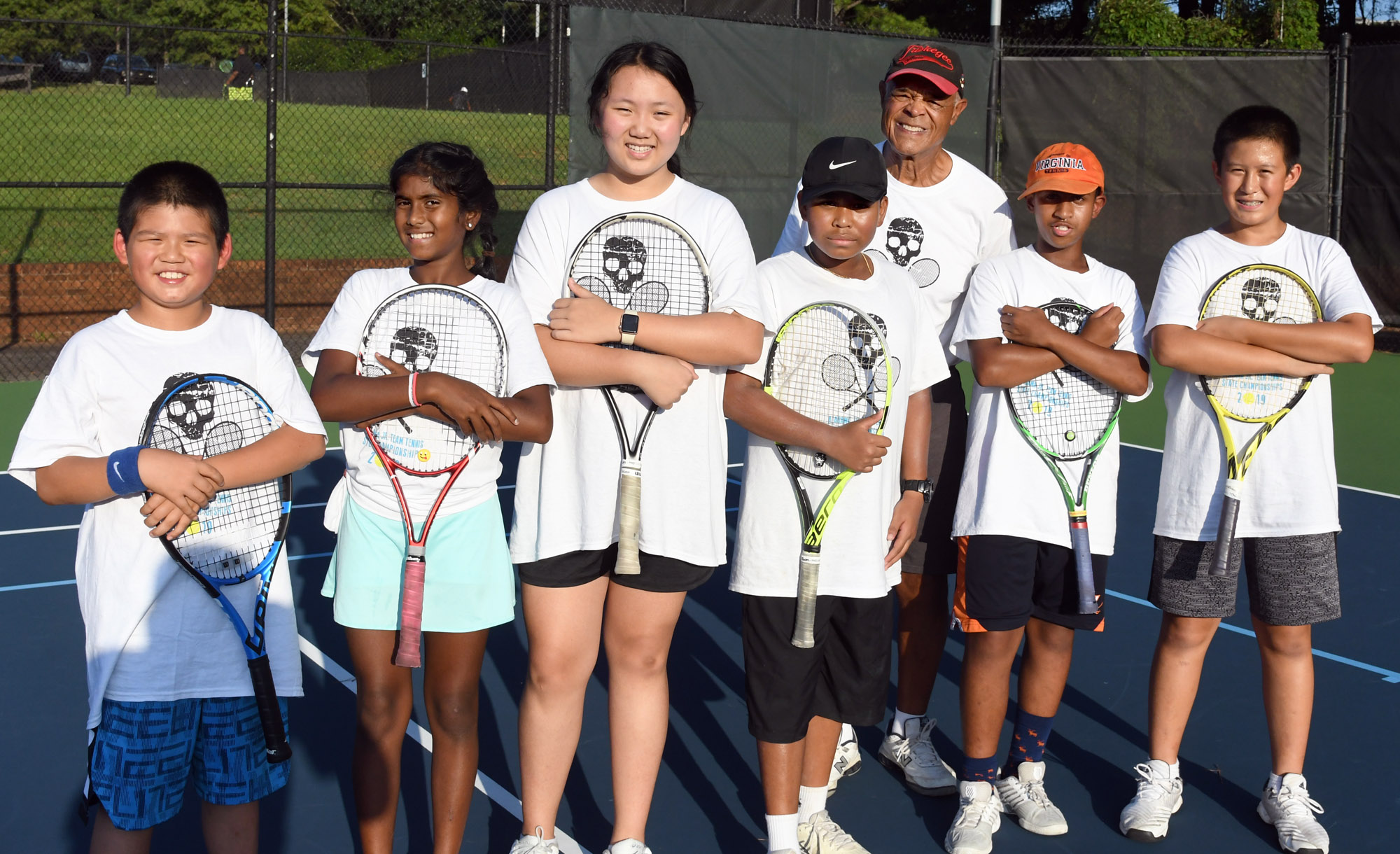
By William C. Singleton III
For the Birmingham Times
If you’re looking for future tennis stars, the courts at George Ward Park on Birmingham’s Southside are as good a place as any to find them. It’s here where you’ll find young tennis players like Ranidi Nagodawithana, 10, of Hoover, swinging rackets and chasing bright green balls, as well as dreams of becoming competitive on the national circuit and perhaps beyond.
For now, the young members of the James Lewis Tennis Scholarship Foundation Inc. (JLTSF) team are more interested in sharpening their game for competition and having fun. Nagodawithana considers tennis great Serena Williams her favorite tennis player, but she’s not concerned about developing Serena’s killer instinct on the court.
“I play because I want to have fun,” she said.
The JLTSF team members are doing more than having fun, though. They’re winning titles, including the 12-and-under (12U) tennis state championship in Auburn in mid-July. The junior team qualified for the state tournament based on overall match victories in tennis sessions played against other tennis clubs over a six-week period, said Coach Rudy Lewis.
During the state tournament held at the Yarbrough Tennis Center on Auburn University’s campus, the JLTSF team fielded teams in four categories: girls singles, boys doubles, girls doubles, and mixed doubles. The JLTSF team won more matches than any other tennis club in the 12U categories, thus assuring itself a first-place finish.
“We felt we had a pretty good chance of possibly winning, but you never know all the various teams who will come out to the state championship,” said Lewis.
The first-place finish qualified the team for the sectionals on Aug. 9–11 in Rome, Ga. where they won their first match before losing, but were still the only team in the state of Alabama in the 12U category playing other 12U teams.
Footsteps of a Giant
Tennis in Birmingham has come a long way since the 1960s, when James “Buddy” Lewis picked up a tennis racket with a mission to teach Birmingham youth and adults the game. James Lewis taught tennis in Ensley and throughout Birmingham free of charge, said Rudy Lewis (no relation to James Lewis).
“He was a guy who was concerned about improving the quality of life for others,” Rudy said.
James Lewis would encourage his students to stay in school and focus on their education.
“Sometimes, he went beyond tennis and tried to help others, whether it was clothing for tennis or money for things outside of tennis. He tried to accommodate others,” Rudy added.
Before James Lewis died in 1995, he shared his vision of wanting to help others through tennis.
“He didn’t know exactly how he wanted to do that,” Rudy Lewis said.
To honor James Lewis’s legacy, the Ensley Tennis Center was renamed in April 1998 the James Lewis Tennis Center, and the nonprofit JLTSF was established in his name to provide scholarships.
“Just like Lewis had started many years ago, the JLTSF aims to utilize all resources available to provide financial assistance in areas that include tennis equipment, tournament fees, transportation fees, and education and enrichment opportunities,” Rudy Lewis said, adding that he has tried to follow in the footsteps of James Lewis.
Rudy Lewis began teaching tennis in 1999 at the James Lewis Tennis Center then moved to the George Ward Tennis Center in 2006; he made the move to develop the junior tennis program, which targets youth ages 4 through 18.
“Many adults were playing at the James Lewis Tennis Center, so we needed more courts for junior tennis courts,” he said.
Lewis didn’t think the tennis courts at George Ward Park were fit for teaching at the time, though, with weeds growing through the cracks of the surface: “We tried to keep it maintained,” he said.
Change of Fortune
A change of fortune would come two years later, when Lewis attended a U.S. Tennis Association (USTA) meeting in Atlanta, Ga., where the organization was entertaining bids from cities to host future tournaments.
“We stood almost a zero chance of getting it because of the condition of the courts and the pro shop,” Lewis recalled.
A high-quality pro shop is important because it provides the first impression of a tennis facility; it’s where players check in and have their rackets strung if necessary.
“We wanted to have an appealing pro shop because that’s where customers go first,” Lewis said. “Before you go out to the courts to play, you check in at the pro shop.”
Still, Lewis and his group applied to host the 2009 and 2010 tournaments.
“Believe it or not, when the people came down to examine our courts and the tennis courts surrounding us, we got awarded that tournament,” he said. “That was a shocker, but the reason the lady from the USTA awarded us the tournaments is because she said she knew that if we got the award, the city would pump hundreds and maybe thousands of dollars not only into our tennis centers but also into the surrounding tennis centers that belong to the city of Birmingham.”
The city, indeed, designated funds to renovate, refurbish, and clean up its tennis facilities. “After that, our tennis center became first class,” Lewis said.
Family
Since 2006, the junior program at George Ward Park has grown to about 60 students. While not huge numbers compared with other sports, it represents progress, Lewis said.
“I would think that more people have an interest than before because of the Williams sisters, [Venus and Serena],” he said. “I think they’re willing to give it a try just to see what it’s like because they’ve done so well with it.”
The team includes Andy Ding; Ranidi Nagodawithana; Allison Xie; Junhui Hudson; James Giles; Parker Liu; Ryann Patterson and Faith Manginga.
Like Serena Williams, Nagodawithana followed her sister into tennis.
“I saw my older sister playing, and it looked kind of fun, so I decided to try,” she said.
Nagodawithana said what she likes most about the tennis club is that her teammates are very helpful and encouraging: “They’re all nice. When I make mistakes, they help me. We help each other.”
Liu, 12, of Vestavia Hills, who said Roger Federer is his favorite tennis player, took up the sport in a different way. Five years ago, he and his father were passing by a University of Alabama at Birmingham tennis court when the ball bounced over the fence in his direction. He retrieved the ball and threw it back to the players. His dad enrolled him in tennis lessons soon after.
Liu said he has learned a lot about tennis, particularly technique he thought looked easy from the outside. As he began to play, he discovered it wasn’t as simple as he initially thought.
“Tennis running is a bit different than regular running,” he said. “In tennis, you don’t want to run straight to the ball. You want to stop—quick stop or slow stop—because if you run straight to it, you usually miss the ball.”
Liu also said he has developed a camaraderie with his teammates that helps make playing tennis fun.
“They’re all pretty friendly. They’re nice to me. They’re all my friends … except her,” he said jokingly pointing to a teammate.
They all started laughing as they returned to the court.

























